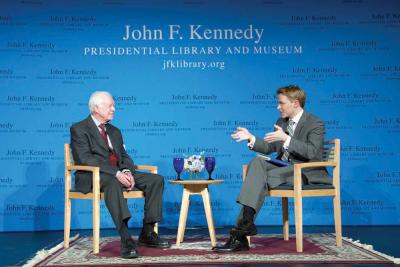November 26, 2014
 Former President Jimmy Carter spoke at a public forum about his book, “A Call To Action: Women, Religion, Violence, and Power” last Thursday at the JFK Library. He was interviewed by Ronan Farrow of MSNBC, right. Photo by Tom Fitzsimmons/John F. Kennedy Library Foundation
Former President Jimmy Carter spoke at a public forum about his book, “A Call To Action: Women, Religion, Violence, and Power” last Thursday at the JFK Library. He was interviewed by Ronan Farrow of MSNBC, right. Photo by Tom Fitzsimmons/John F. Kennedy Library Foundation
Nearly 35 years after first coming to Columbia Point to open the John F. Kennedy Presidential Library and Museum, former President Jimmy Carter returned last Thursday to talk about the worldwide problem of violence and discrimination against girls and young women, it is the main thrust of his forthcoming book,“A Call To Action: Women, Religion, Violence, and Power.”
No issue was too great or too small for the 90-year-old former peanut farmer from Georgia to address as he touched on issues ranging from female genital mutilation in Egypt, access to latrines in Ethiopia, sexual assault in America’s military and college campuses, and Middle East peace.
“What I have learned most is how pervasive the horrible abuse of women and girls is,” the 39th president told his audience. The Library’s Stephen Smith Hall was at capacity as Carter sat for an interview with MSNBC show host Ronan Farrow.
A self-described deeply religious man, Carter lamented the “misinterpretation of holy scriptures,” that motivate and protect inequality toward women. As men, he said, “we benefit from the fact that men are given superior positions and we use holy scriptures that are carefully selected to show women are not equal in eyes of God. He made note that he had recently become a member of a local Baptist church with female deacons.
Carter said he has sent a copy of his book to Pope Francis, who responded promptly, saying “the future will bring women into prominent positions.” He did the same with Boston’s Cardinal Sean O’Malley, who responded, said Carter, by justifying different treatment between men and women because only women bear children. “I don’t agree with that,” he added. “There is no verse in the Bible that claims Jesus Christ treated women differently than men.”
The conversation strayed into other current events as Farrow asked Carter if President Barack Obama had overstepped his executive powers with his order to act immediately to assist millions of undocumented immigrants currently in the United States.
“Under the circumstances, no,” Carter said. “He’s been forced into this by a recalcitrant Congress.” He added that he thought it was okay that the president waited to take action until after the midterm elections, but he was “mistaken to think that it would make a difference.”
Carter also addressed his one-term legacy, often the target of punditry about leadership, when he addressed onetime presidential nominee John McCain’s saying on Fox News, “I thought Jimmy Carter was bad but he pales in comparison to the president, in my opinion.”
For his part, Carter didn’t hesitate: “I was lucky to keep our country in peace. We never dropped a bomb. We never fired a missile. We put war as a response to a challenge at the bottom of our priority list.”
At the end of the conversation, Carter discussed his first trip to the Kennedy Library, when he “came to Boston with a heart filled with emotion.” He recounted the pain he had experienced in 1963 on learning that the president was dead. “It is one of the most grievous blows I ever felt and I still feel that way. It is a great source of pride to me whenever I might be compared in some ways with him."


